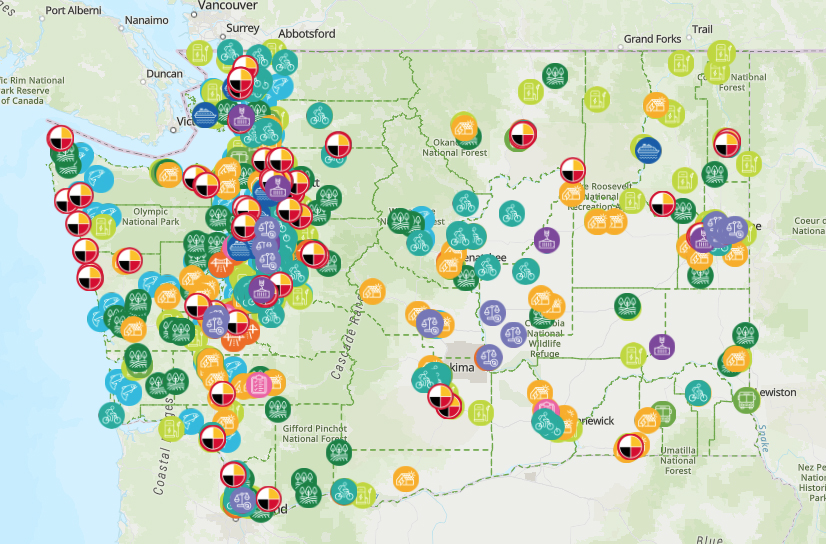Vote No on I2117 – Safeguard Washington’s Future
Vote No on I-2117 – Safeguard Washington’s Future
Hear from Jason Sheehan, a dairy farmer in Sunnyside, about how I-2117 would hurt Washington agriculture – then pledge to vote NO on I-2117.
What is I-2117?
I-2117 will be on Washington’s ballot this November. It aims to scrap Washington’s Climate Commitment Act (CCA). This would eliminate the jobs, economic growth, and environmental funding that come from this program.
What is Washington’s Climate Commitment Act?
The CCA caps and reduces greenhouse gas emissions from the state’s biggest polluters and industries. It gives businesses flexibility to find cost-effective ways to cut carbon output. This robust program works with other key climate policies to help Washington meet its goal of slashing greenhouse gas emissions by 95% by 2050.
The CCA also puts environmental justice and fairness at the forefront of climate policy. It ensures that areas most affected by air pollution now will breathe cleaner, healthier air as the state cuts greenhouse gases. Plus, money from emission allowance auctions will fund new climate-resilience programs, clean transportation, and efforts to address health disparities across the state.
Why Voting Against I-2117 Matters
READ: Why BP Petroleum and Amazon want to save Washington state’s carbon market.
Impact on Economy and Jobs
Defeating I-2117 will allow the continued economic boost from the CCA. The Climate Commitment Act has been key in creating green jobs and drawing private-sector investments, which are vital for Washington’s economic health and growth. It threatens to cut billions in investments from community priorities across all Washington counties. This could lead to job losses in sectors directly and indirectly linked to infrastructure projects and green energy initiatives. Less investment could also hurt services that depend on these industries, causing an economic downturn.
Funding Gaps and Project Holdups
If I-2117 passes, it could hurt Washington’s transportation infrastructure, which needs repairs funded by the CCA. The state would lose a big chunk of the $17 billion transportation funding package, which heavily relies on CCA revenues. CCA funding supports many projects, including highway upkeep, bridge repairs, and expanding public transit. If I-2117 succeeds, many projects to improve transportation could face major delays or cancellations, affecting daily commutes and worsening traffic.
Click the map for a detailed analysis and evaluation of crucial investments and initiatives throughout Washington State facing potential elimination if I-2117 is approved. This resource offers key insights into I-2117’s possible impacts, emphasizing the necessity of opposing it. Source: Clean and Prosperous Washington
Costs for Communities and Families
I-2117 could shift the financial burden of pollution and infrastructure maintenance onto local communities and families. Without cap-and-trade, costs tied to environmental damage and infrastructure upkeep could rise, putting more pressure on Washington residents. This shift could lead to even higher living costs, affecting the affordability of transportation, housing, and basics like groceries, as the initiative could drive up prices across the supply chain.
Helping Vulnerable Communities
The Climate Commitment Act has directed significant resources to improve living conditions in overburdened communities. Voting against I-2117 ensures continued support for these communities, helping them deal with environmental challenges and improve overall community health.
Coalition and Community Efforts
The campaign against I-2117 has strong support from a diverse coalition, including well-known organizations and influential figures. Over 200 groups back the No on I-2117 campaign, including:
- AAA Washington
- Washington State Labor Council
- BP America Petroleum
- Washington Solar Energy Industries Association (WASEIA)
- Certified Electrical Workers of Washington
- Coalition of Immigrants Refugees and Communities of Color (CIRCC)
- League of Women Voters of WA
- Teamsters 117
- And numerous tribes, faith organizations and environmental groups.
This shows broad opposition to the initiative from various sectors. These groups stress the potential negative impacts of I-2117 on local economies, public health and environmental protection. They call for a united effort to defeat the initiative and protect Washington’s exceptional climate policies.
Oil Industry’s Surprising Stance on CCA and I-2117
Interestingly, “the Western States Petroleum Association — representing four of Washington’s oil refineries, plus others along the Pacific Coast — plans to sit out the balloting. ‘We do not oppose the [Climate Commitment Act] and believe the cap-and-trade program should be fixed rather than repealed. We are not involved in the campaign,’ wrote WSPA spokesman Kevin Slagle in an email.
The fifth Washington oil refinery is owned by BP America, which is part of the No On 2117 coalition.” Source: Stand, John. “The multimillion-dollar fight over WA’s cap-and-invest program”, Cascade PBS, May 3, 2024.
The oil industry’s stance on the No on I-2117 campaign may seem surprising, but experts say the reasonsing is simple: The companies prefer market trading to emission regulations. Support for the CCA even from sectors financially affected by cap-and-trade validates that it is the most fair and cost effective way to manage the negative effects of excess carbon.
READ: Amazon, BP Counter Push to Repeal Washington Climate Law
How You Can Make a Difference
- Vote “NO” to cutting funds for public transit.
- Vote “NO” to weakening safeguards for health, forests, and farms.
- Vote “NO” to losing well-paying jobs.
- Vote “NO” to making families and struggling communities bear the costs of environmental issues.
Your opinion and efforts matter greatly. By opposing I-2117, you join others fighting for a cleaner, fairer, and more sustainable Washington. This movement is a chance to show a shared vision of a future where economic growth and environmental health work together. Together, we can create positive change for the future of our families and our state.

